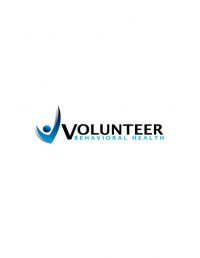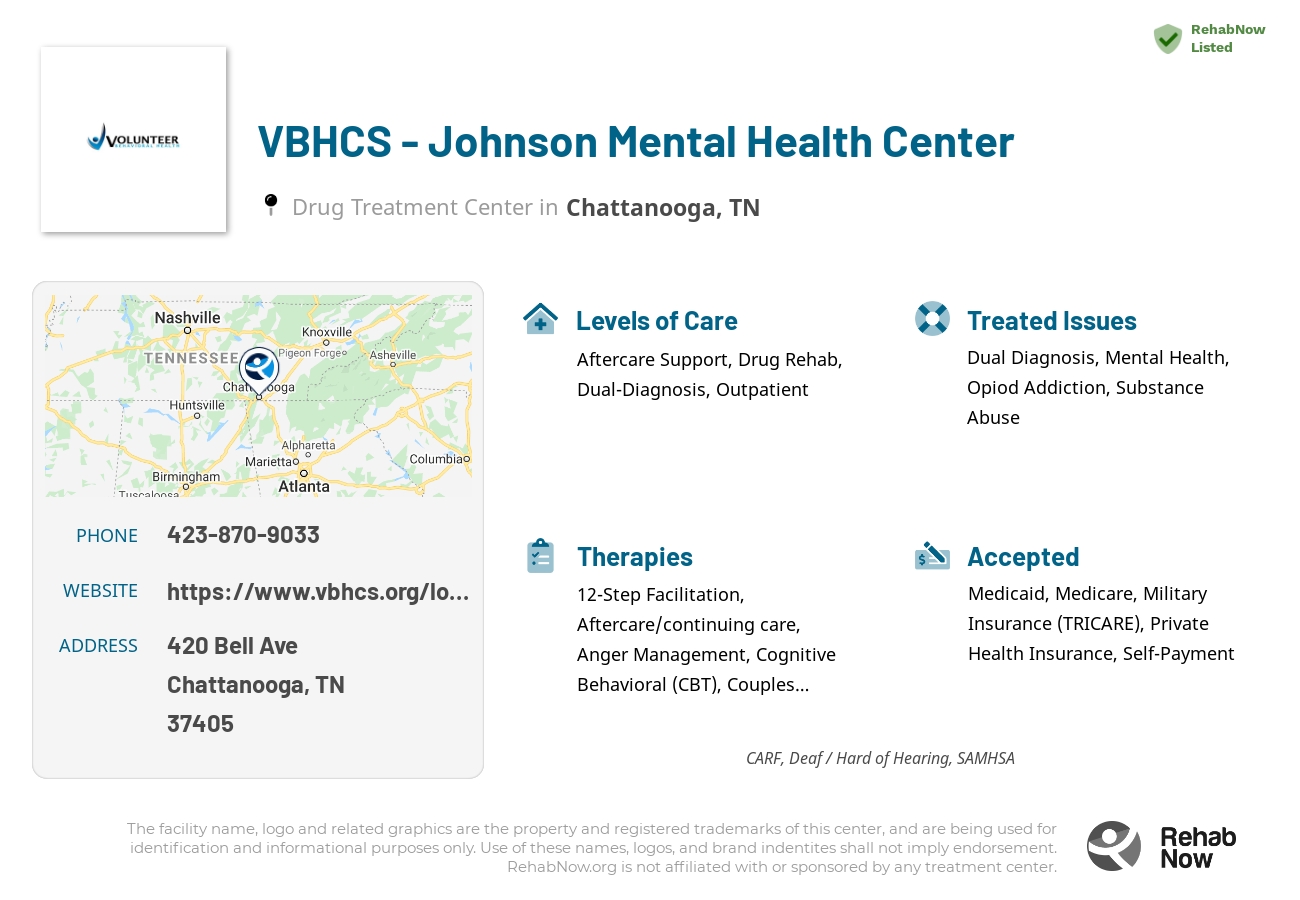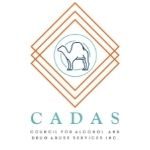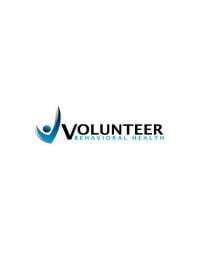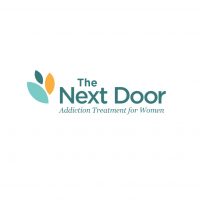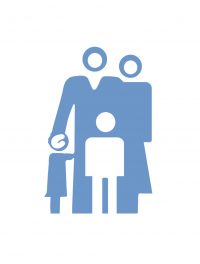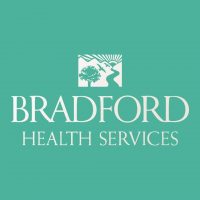VBHCS - Johnson Mental Health Center
Drug Rehab Center in Chattanooga, Tennessee
Johnson Mental Health Center in Chattanooga, TN is a CARF-accredited and SAMHSA-approved Addiction Treatment Facility that offers individuals struggling with opioid addiction, substance abuse, and dual diagnosis a comprehensive drug rehab program with multiple levels of care, tailored individualized treatment plans, and accepts most private health insurance plans.
About This Tennessee Facility
Volunteer Behavioral Health - Johnson Mental Health Center in Chattanooga, Tennessee, offers comprehensive outpatient services for adults, children, and families struggling with addiction and mental health issues. Its innovative approach focuses on prevention, treatment, and recovery.
- Specializes in opioid addiction, substance abuse, dual diagnosis, and alcoholism
- Provides evidence-based therapies like CBT, DBT, and trauma therapy
- Offers various treatment options including outpatient, inpatient, and aftercare
- Tailors services for adolescents, military personnel, and those with forensic needs
This CARF and SAMHSA-accredited facility ensures individuals receive personalized care, promoting long-term recovery and community well-being. Its mission is to serve through a continuum of services, ensuring help today leads to a better tomorrow.
Johnson Mental Health Center treats a range of addictions, including opioids, drugs, and alcohol, as well as mental health conditions. Treatment methods encompass individual, group, and family therapies, along with anger management, couples counseling, and discharge planning. Levels of care include outpatient, inpatient, and aftercare support.
Genders
Ages
Modality
Additional
Accreditations
SAMHSA

CARF
The Commission on Accreditation of Rehabilitation Facilities (CARF) is a non-profit organization that specifically accredits rehab organizations. Founded in 1966, CARF's, mission is to help service providers like rehab facilities maintain high standards of care.
Conditions and Issues Treated
Rehab centers in Tennessee exist to help individuals bounce back from substance abuse. Drug addiction refers to the use of illegal drugs and improper use of prescription drugs. Substance abuse includes all problems that stem out from using psychoactive substances. Centers like VBHCS - Johnson Mental Health Center are here to help.
Opioids are a set of drugs prescribed for pain relief. Opioid addiction for Tennessee residents refers to the compulsive seeking of opioids, even when they are not required medically. Treatment involves medication-assisted therapy in which medicines, counseling, and behavioral therapies are all utilized at VBHCS - Johnson Mental Health Center.
A dual-diagnosis describes two medical issues that are happening at the same time. They may or may not be related. Over 50% of people with an addiction in Tennessee have another mental health condition. Screening for both addiction and any untreated mental health issue is essential, and individually managed by VBHCS - Johnson Mental Health Center.
Levels of Care Offered at VBHCS - Johnson Mental Health Center
This center offers a variety of custom treatment tailored to individual recovery. Currently available are Aftercare Support, Drug Rehab, Dual-Diagnosis, Outpatient, with additional therapies available as listed below.
Aftercare support refers to the follow-up care provided after the initial rehab program. The quality of aftercare support plays an important role in preventing relapses and sustains recovery. Aftercare support at VBHCS - Johnson Mental Health Center is personalized according to the needs of the patient in Tennessee.
Therapies & Programs
Individual therapy refers to one-on-one psychotherapy between a patient and their VBHCS - Johnson Mental Health Center therapist. Individual therapy seeks to help identify the issues that drive and contribute to a client’s addiction or alcoholism. Another goal of individual counseling is to assist the client to learn how to manage their lives without alcohol or drugs.
Therapy for couples decreases unhealthy behavior in a relationship that can trigger addiction. Either, or both, members of the couple will be improved by this. This treatment administered by VBHCS - Johnson Mental Health Center still targets addiction and can also make a relationship healthier through a variety of methods.
Group therapy occurs in a group setting as opposed to a one on one setting. It benefits patients by providing a feeling of support and letting them know they are not alone. Patients at VBHCS - Johnson Mental Health Center also learn to build trust and understanding and gain perspective through discussions.
After experiencing trauma, it’s crucial to look for a facility that can provide trauma therapy. This approach zeroes in on the traumatic incidents that a patient has encountered in the past, recent or not. It’s been widely known that trauma can make an individual resort to alcohol or other substances to mask their troubles and pain. Trauma can originate from domestic violence, sexual abuse, an early encounter with death, sexual assault, and many more. The goal of trauma therapy at VBHCS - Johnson Mental Health Center in Chattanooga, TN is to help the patient see beyond the trauma and move forward. Mental health professionals will facilitate the patient’s journey and see to it that he or she is no longer a victim of his or her traumatic experiences and has wholly regained his or her personal power.
DBT, also known as dialectical behavior therapy, is a form of cognitive behavioral therapy (CBT) that helps people understand how their thoughts, behaviors, and feelings all connect. This can give them more control over their actions, effectively stopping self-harm ideations and attempts in some patients. It can also help put people in control over some mental struggles, like borderline personality disorder.
Most individuals suffering from addiction have low self-awareness, so they end up making poor decisions. Cognitive Behavioral Therapy (CBT) is suitable for patients recovering from an addiction of any kind. Through it, patients become more aligned with their thoughts, emotions, and behaviors, giving them a better opportunity to respond appropriately to temptations and negative feelings.
This therapy modality at VBHCS - Johnson Mental Health Center in Chattanooga, TN strengthens a person’s ability to stay on top of their emotional state and learn new stress management techniques so they won’t give in to the temptations easily. Moreover, CBT helps people communicate and express their emotions well, which can be vital in relapse management. CBT is also suitable for managing co-occurring disorders like depression and bipolar illness.
A 12-Step Program is a common method that is used to treat addiction. This format is used for both drug and alcohol treatment. It is extremely popular and successful for large numbers of people. It is a relatively simple set of steps that are done continuously in order to move through life with awareness, accountability and honesty. 12-Step programs are available in most every city in the Unites States. They are available in person, electronically and virtually through phone or web-based meetings.
Payment Options Accepted
For specific insurance or payment methods please contact us.
Is your insurance accepted?
Ask an expert, call (888) 674-0062
Additional Details
Specifics, location, and helpful extra information.
Chattanooga, Tennessee 37405 Phone Number(423) 870-9033 Meta DetailsUpdated April 15, 2024
Staff Verified
What else do people call VBHCS – Johnson Mental Health Center?
People have occasionally also searched for “Volunteer Behavioral Health - Johnson Mental Health Center in Tennessee”
Patient Reviews
There are no reviews yet. Be the first one to write one.
Chattanooga, Tennessee Addiction Information
Tennessee joins the list of states with an above-average rate for drug and/or alcohol-induced deaths. Most of these deaths are related to opioids, such as prescription opioids. The Volunteer State ranks 2nd highest in the nation for the number of prescriptions given out. The state also ranks at the top for prescription drug-related overdoses.
In 2013 there were 677 admissions to substance abuse treatment facilities in Chattanooga, TN, for various drugs, including alcohol, marijuana, cocaine, and heroin. In 2016, 17.2 per 100,000 population overdose deaths in Tennessee. The majority of these overdose deaths involved an opioid. From 2013 to 2016, the number of people admitted to rehab for heroin addiction increased by 226%. Common treatments in Chattanooga include inpatient rehab, outpatient rehab, and 12-Step programs.
Treatment in Nearby Cities
- Lenoir City, TN (78.1 mi.)
- Mountain Home, TN (186.0 mi.)
- Sparta, TN (59.9 mi.)
- Savannah, TN (166.3 mi.)
- McMinnville, TN (50.2 mi.)
Centers near VBHCS - Johnson Mental Health Center
The facility name, logo and brand are the property and registered trademarks of VBHCS - Johnson Mental Health Center, and are being used for identification and informational purposes only. Use of these names, logos and brands shall not imply endorsement. RehabNow.org is not affiliated with or sponsored by VBHCS - Johnson Mental Health Center.
